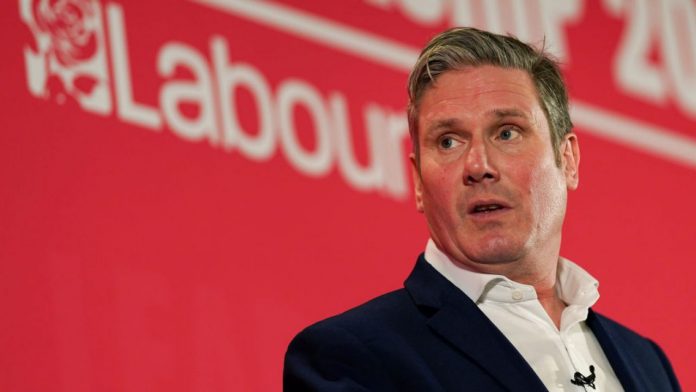Keir Starmer has said Labour will have a completely new blueprint for power not based on previous manifestos, as he told activists he would spend the summer making extended visits to places the party must win.
The Labour leader told a conference hosted by the centre-left thinktank Progressive Britain on Sunday that the party’s policy review would not take previous manifestos as its starting point, despite the close attachment of many members to the radical manifestos drawn up under Jeremy Corbyn’s leadership.
Those promised to re-nationalise key industries, including rail, energy networks and Royal Mail, and made extensive new offers on childcare, adult education and social care.
Two key Labour centrist groups, Progress and Policy Network, merged at the conference. The latter is run by the former New Labour adviser Peter Mandelson.
Mandelson offered up his experience to Starmer at the conference, saying the party should start listening more closely to those who had won elections for Labour, rather than seeing the Blair years as an “embarrassing aunt”.
In his Q&A, Starmer said his focus would be on Labour’s economic offer, but that it would be future-facing, rather than taking lessons from either Corbyn or Blair.
“We can’t hug someone from the past, some historical figure, and say all we need is X. We’ve got to do it, the hard work is on us,” he said.
The review, led by the new party chair, Anneliese Dodds, would not take the 2019 manifesto as its launchpad, Starmer said. “You don’t go through a review like this by picking up the last document.
“What we’re not doing is simply gathering up thoughts and then trying to write something that reflects those thoughts. Because we need transformative and modernising change.”
Starmer said the infighting of last week, in which a briefing war broke out between his office and the deputy leader Angela Rayner’s, had “not been a pleasant experience … The way we did it wasn’t the best and there’s no getting away from that”.
Starmer said he would spend the summer on the road, but that it would be not “just half-day visits but going for two or more days to a particular place”.
Speaking at the close of the conference, Mandelson said he could “help build the new electoral coalition Labour needs for victory” and backed Starmer’s decision that the party’s vision would not be based on past offers.
“We should not fight any election with a battle plan or manifesto from the past, including the one that gave us our landslide in 1997,” he said.
“There are some in the party who think that if we sit tight on our previous policies the electorate will catch up with us. That our only problem in 2017 or 2019 was that we were ahead of our time and that the experience of the pandemic means that the public will now see the efficacy of our previous policies.
“It is a remarkable conceit to tell the voters that they are now allowed to see the error of their false consciousness.”
Mandelson also said, however, that the party might “progress if we heard a little less from Jeremy Corbyn and John McDonnell on what Labour needs to do to win elections and listened a little more to people who actually won elections.
“I have already said no one is suggesting we return to the policy prospectus of the 1990s but it might also be an idea to stop treating New Labour as an embarrassing aunt in the corner and more as something which might, just might, offer some insight on what it takes to win and defeat the Tories.”
… we have a small favour to ask. Millions are turning to the Guardian for open, independent, quality news every day, and readers in 180 countries around the world now support us financially.
We believe everyone deserves access to information that’s grounded in science and truth, and analysis rooted in authority and integrity. That’s why we made a different choice: to keep our reporting open for all readers, regardless of where they live or what they can afford to pay. This means more people can be better informed, united, and inspired to take meaningful action.
In these perilous times, a truth-seeking global news organisation like the Guardian is essential. We have no shareholders or billionaire owner, meaning our journalism is free from commercial and political influence – this makes us different. When it’s never been more important, our independence allows us to fearlessly investigate, challenge and expose those in power.







